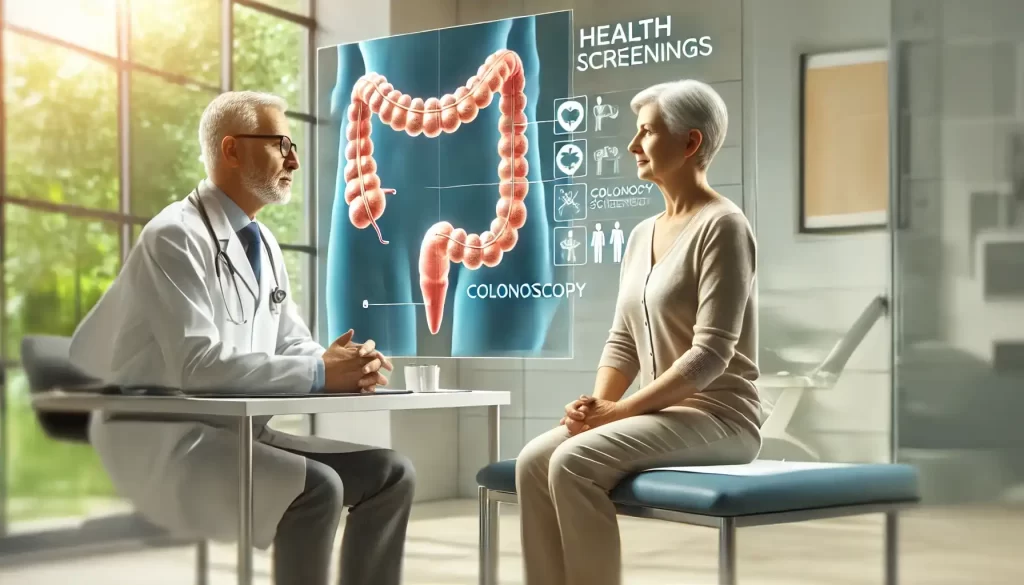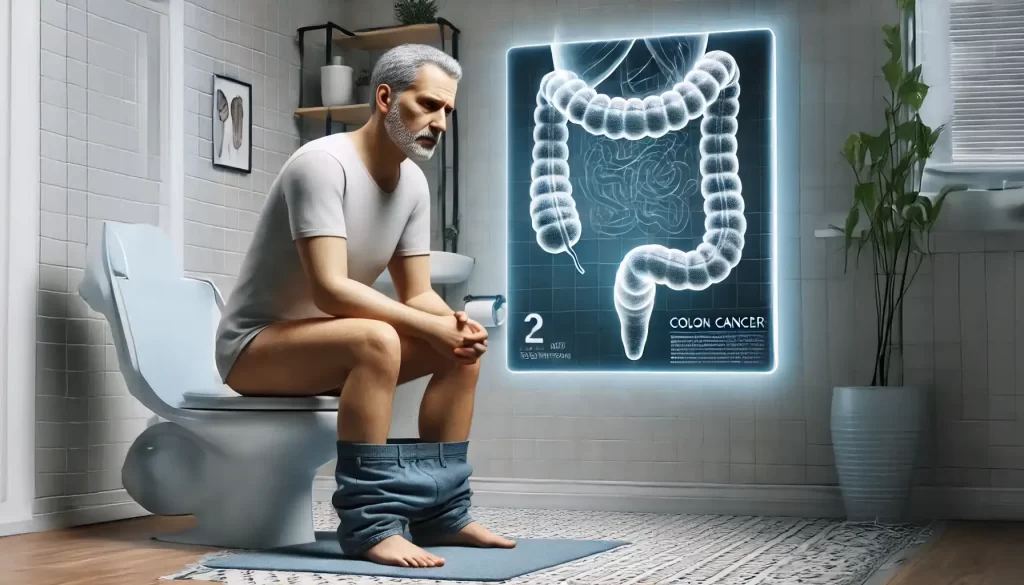Colon cancer risks over 50 become a significant health concern for many adults. As we age, changes in our body, lifestyle habits, and genetic factors all contribute to an increased likelihood of developing this condition. Fortunately, understanding these risks and taking proactive steps can make a critical difference in prevention and early detection.
In this article, you’ll learn:
- Why colon cancer risks rise dramatically after age 50.
- The key factors that influence your chances of developing colon cancer.
- Practical measures for prevention, screenings, and early detection.
Let’s explore how to safeguard your health and navigate the challenges of colon cancer risks over 50.
Why Does the Risk of Colon Cancer Increase After Age 50?
Reaching age 50 marks a significant shift in your overall health, especially when it comes to colon cancer risks. Several factors related to aging contribute to the increased likelihood of developing this condition. Understanding these changes can help you take proactive steps toward prevention and early detection.
Age-Related Changes in the Colon and Digestive System
As the body ages, the digestive system undergoes gradual changes.
- The colon may become less efficient at processing waste and absorbing nutrients.
- Age-related inflammation in the gastrointestinal tract can contribute to the development of polyps, which are small growths in the colon that may become cancerous over time.
- Changes in gut microbiota, the community of bacteria in the digestive system, may also play a role in colon cancer risk.
Accumulation of Genetic Mutations Over Time
Colon cancer often develops from genetic mutations that occur in the cells of the colon.
- Over decades, these mutations can accumulate, especially if the body’s DNA repair mechanisms become less effective.
- Environmental factors such as diet, smoking, and exposure to carcinogens may exacerbate the mutation rate, increasing cancer risk.
- Inherited genetic predispositions, such as Lynch syndrome or familial adenomatous polyposis, can further heighten the likelihood of developing colon cancer after 50.
Slower Cell Repair Processes as We Age
The body’s natural ability to repair damaged cells diminishes with age.
- In younger individuals, damaged cells are more effectively identified and repaired or eliminated by the immune system.
- As we age, the efficiency of these repair processes declines, allowing abnormal cells to multiply unchecked.
- This slower repair process creates an environment where precancerous polyps or tumors are more likely to develop and grow.
Key Takeaway
The increase in colon cancer risk after 50 is linked to both natural aging processes and environmental factors. By staying informed about these changes and prioritizing regular screenings, you can take essential steps to protect your health and reduce your risk. Early detection remains one of the most powerful tools in combating colon cancer.

Key Risk Factors for Colon Cancer After 50
Understanding the key risk factors for colon cancer after 50 can empower you to take preventive steps and reduce your chances of developing this condition. Several factors, ranging from genetic predisposition to lifestyle choices, contribute to increased risks as we age.
Family History and Genetic Predisposition
Your family history plays a significant role in your colon cancer risk.
- Inherited Gene Mutations: Conditions like Lynch syndrome and familial adenomatous polyposis (FAP) significantly increase the likelihood of developing colon cancer.
- Immediate Family History: If a parent, sibling, or child has had colon cancer, your risk may be two to three times higher than someone without a family history.
- Early-Onset Cases: Family members diagnosed with colon cancer before age 50 indicate a stronger genetic link and may require earlier and more frequent screenings.
Lifestyle Factors
Your daily habits and lifestyle choices have a profound impact on your colon health.
- Diet:
- Diets high in red meat, processed foods, and low in fiber are associated with an increased risk of colon cancer.
- A lack of fruits, vegetables, and whole grains deprives your body of essential nutrients and antioxidants that protect against cancer.
- Smoking and Alcohol:
- Long-term smoking damages DNA and promotes inflammation, contributing to cancer development.
- Excessive alcohol consumption can increase colon cancer risk, especially in combination with other factors.
- Lack of Exercise:
- A sedentary lifestyle contributes to obesity, which is a significant risk factor for colon cancer.
- Regular physical activity improves digestion and reduces inflammation, helping to lower overall risk.
Pre-Existing Conditions
Certain health conditions can predispose you to colon cancer.
- Polyps:
- Precancerous polyps, also known as adenomas, are small growths in the colon that can develop into cancer if left untreated.
- Regular colonoscopies can detect and remove these polyps before they become problematic.
- Inflammatory Bowel Disease (IBD):
- Conditions like Crohn’s disease and ulcerative colitis cause chronic inflammation in the digestive tract, increasing cancer risk.
- People with IBD often require more frequent screenings to monitor their colon health.
Key Takeaway
While age is a significant factor in colon cancer risk, family history, lifestyle habits, and pre-existing conditions can amplify those risks. By adopting a healthier lifestyle and staying proactive with screenings, especially if you fall into high-risk categories, you can significantly lower your chances of developing colon cancer.
Warning Signs and Symptoms to Watch For
Recognizing the warning signs of colon cancer can lead to early diagnosis and treatment, which significantly improves survival rates. While symptoms may vary from person to person, there are key indicators that should never be ignored.
Persistent Changes in Bowel Habits
Alterations in bowel movements can be one of the earliest signs of colon cancer.
- Constipation or Diarrhea: Unexplained and persistent changes in stool consistency or frequency.
- Narrow Stools: Stools that appear pencil-thin may indicate a blockage or narrowing in the colon.
- Incomplete Evacuation: A constant feeling that you still need to have a bowel movement even after going.
If these changes last longer than a few weeks, it’s crucial to consult a healthcare professional.
Blood in Stool or Rectal Bleeding
Blood in the stool is a common symptom of colon cancer, though it can also result from other conditions.
- Bright Red Blood: Often indicates bleeding in the lower colon or rectum.
- Dark or Tarry Stools: Suggests bleeding higher up in the digestive tract.
- Occult Blood: Microscopic blood that isn’t visible to the naked eye but can be detected through stool tests.
While not all cases of rectal bleeding are due to cancer, it’s essential to investigate the cause.

Unexplained Weight Loss and Fatigue
Colon cancer can affect your energy levels and metabolism.
- Sudden Weight Loss: Losing weight without changes in diet or exercise may indicate cancer interfering with nutrient absorption or metabolism.
- Chronic Fatigue: Persistent tiredness, even after adequate rest, can result from anemia caused by internal bleeding.
These symptoms, especially when combined with other warning signs, warrant immediate medical attention.
Key Takeaway
Early recognition of symptoms like changes in bowel habits, rectal bleeding, and unexplained weight loss can be lifesaving. If you experience any of these warning signs, don’t hesitate to seek medical advice. Early detection remains the most effective way to combat colon cancer.
The Importance of Regular Screenings
Regular screenings are a crucial tool in the fight against colon cancer, especially for individuals over the age of 50. They help detect abnormalities early, often before symptoms develop, significantly increasing the chances of successful treatment.
Colonoscopy: The Gold Standard for Early Detection
Colonoscopy remains the most effective screening method for colon cancer.
- How It Works: A flexible tube with a camera (colonoscope) is inserted into the colon to check for polyps, tumors, or other abnormalities.
- Preventive Benefits: Polyps, which can become cancerous over time, can be removed during the procedure, preventing the development of cancer.
- Accuracy: Colonoscopy provides a clear view of the entire colon, ensuring thorough examination and accurate diagnosis.
Guidelines for Screenings After Age 50
Most medical guidelines recommend starting regular colon cancer screenings at age 50, but individual risk factors may necessitate earlier or more frequent tests.
- Average Risk Individuals: A colonoscopy every 10 years, starting at age 50.
- High-Risk Groups: Those with a family history of colon cancer, genetic predispositions, or conditions like inflammatory bowel disease may need to start screenings earlier, often by age 40, and repeat them more frequently.
- Alternative Tests: While colonoscopy is the most comprehensive option, other methods like stool tests or CT colonography may also be used for initial screening.
What to Expect During and After a Colonoscopy
Understanding the process can alleviate concerns and encourage participation in regular screenings.
- Preparation:
- Dietary restrictions and bowel prep (cleansing solution) are necessary to ensure a clear view of the colon.
- Follow the doctor’s instructions closely for optimal results.
- The Procedure:
- Typically performed under sedation, the procedure is painless and lasts about 30-60 minutes.
- The doctor examines the colon and removes any polyps or suspicious growths.
- Recovery:
- Most people feel fine after the sedation wears off, though you’ll need someone to drive you home.
- Mild bloating or cramping is common but resolves quickly.
Key Takeaway
Regular colon cancer screenings are lifesaving. Colonoscopies not only detect cancer early but also prevent it by removing precancerous polyps. Following recommended guidelines and staying proactive about screenings after age 50 is one of the most effective ways to protect your health.
Preventive Measures to Lower Your Risk
Taking proactive steps to reduce your risk of colon cancer is essential, especially as you age. Lifestyle changes can significantly decrease the likelihood of developing this condition while improving your overall health.
Adopting a High-Fiber, Low-Fat Diet
A healthy diet is one of the most effective ways to lower your risk of colon cancer.
- Increase Fiber Intake:
- Fiber-rich foods like whole grains, fruits, vegetables, and legumes promote digestive health and reduce the risk of colon polyps.
- Aim for at least 25-30 grams of dietary fiber daily.
- Reduce Saturated Fats:
- High-fat diets, especially those rich in red and processed meats, are linked to increased colon cancer risk.
- Opt for lean proteins like fish, poultry, or plant-based sources such as beans and tofu.
Incorporating Regular Exercise Into Your Routine
Staying active is not only good for your general health but also plays a role in cancer prevention.
- Why Exercise Helps:
- Physical activity improves digestion, reduces inflammation, and helps maintain a healthy weight—all of which lower colon cancer risk.
- How Much Exercise:
- Aim for at least 150 minutes of moderate exercise per week, such as brisk walking, swimming, or cycling.
- Strength training exercises twice a week can also support overall health.
Limiting Alcohol and Quitting Smoking
Cutting back on alcohol and eliminating tobacco use are critical for reducing cancer risk.
- Alcohol Consumption:
- Excessive drinking is associated with an increased risk of colon cancer. Stick to recommended guidelines—one drink per day for women and two for men, or less.
- Smoking:
- Tobacco use damages DNA and promotes cancerous cell growth. Quitting smoking reduces your risk of colon cancer and other serious health conditions.
Key Takeaway
Preventing colon cancer starts with adopting a healthy lifestyle. A high-fiber, low-fat diet, regular exercise, and avoiding harmful habits like smoking and excessive alcohol consumption can significantly lower your risk. By making these changes, you not only reduce the likelihood of developing colon cancer but also improve your overall quality of life.
Debunking Common Myths About Colon Cancer
Misinformation and myths about colon cancer can prevent people from taking proactive steps toward prevention and early detection. Let’s debunk some of the most common misconceptions to help you make informed decisions about your health.
Myth 1: Colon Cancer Only Affects Men
The Truth: Colon cancer affects both men and women equally.
- While it’s true that men may have a slightly higher overall risk, colon cancer is a leading cause of cancer-related deaths in women as well.
- Factors like age, lifestyle, and family history are significant contributors to risk, regardless of gender.
- Everyone over 50, regardless of sex, should consider routine screenings to catch potential issues early.
Myth 2: You Don’t Need a Colonoscopy If You Feel Healthy
The Truth: Colon cancer often develops without noticeable symptoms in its early stages.
- By the time symptoms appear, the cancer may have already progressed to a more advanced stage.
- Regular screenings like colonoscopies can detect precancerous polyps or early-stage cancer when treatment is most effective.
- Feeling healthy is not an indicator of a clean bill of health when it comes to colon cancer.
Myth 3: Screening Tests Are Always Painful or Uncomfortable
The Truth: Modern screening methods are designed to be as comfortable and minimally invasive as possible.
- Colonoscopies are typically performed under sedation, ensuring you feel no pain during the procedure.
- Recovery from a colonoscopy is usually quick, with most people resuming their normal activities the same day or the next.
- Alternative screening options like stool tests and CT colonography provide non-invasive ways to check for colon cancer risk.
Key Takeaway
Believing in myths about colon cancer can put your health at risk. Understanding the facts ensures that you make informed choices about screenings and prevention. Don’t let misinformation stop you from taking steps to protect your health—knowledge is your best defense against colon cancer.
FAQs About Colon Cancer Risks Over 50
Colon cancer risks increase with age, but understanding the nuances can help you stay informed and proactive about your health. Here are answers to some of the most frequently asked questions about colon cancer risks after age 50.
Can Younger People Also Develop Colon Cancer?
Answer: Yes, while colon cancer is more common in people over 50, younger individuals can also develop it.
- Early-onset colon cancer is on the rise, with factors like genetics, lifestyle, and obesity playing significant roles.
- Individuals with a family history of colon cancer or conditions like Lynch syndrome may need to start screenings earlier than age 50.
- It’s crucial for people of all ages to recognize symptoms like changes in bowel habits or blood in the stool and consult a doctor promptly.
How Often Should I Get Screened After Turning 50?
Answer: The frequency of screenings depends on your health status and risk factors.
- For those at average risk, colonoscopies are typically recommended every 10 years starting at age 50.
- If polyps are found during a colonoscopy, follow-up screenings may be needed every 3-5 years.
- High-risk individuals, such as those with a family history of colon cancer or inflammatory bowel disease, may require more frequent screenings.
Are At-Home Stool Tests as Effective as Colonoscopies?
Answer: At-home stool tests can be effective for initial screenings but have limitations.
- Tests like the FIT (Fecal Immunochemical Test) or Cologuard detect blood or DNA markers in stool, which may indicate colon cancer or polyps.
- While convenient and non-invasive, these tests are less comprehensive than colonoscopies and cannot detect or remove polyps.
- If an at-home stool test yields positive results, a colonoscopy is still necessary to confirm the diagnosis and provide treatment.
Key Takeaway
Colon cancer risks and screening recommendations can vary based on age, health history, and risk factors. Whether you’re considering your first screening or exploring at-home tests, staying informed and consulting your doctor are critical steps toward prevention and early detection.
Conclusion
Awareness and regular check-ups are vital in reducing the risks of colon cancer, especially after the age of 50. Understanding the factors that increase your risk, recognizing early warning signs, and staying consistent with screenings can make all the difference in detecting and preventing this potentially life-threatening condition.
Taking proactive steps such as adopting a high-fiber diet, staying physically active, and avoiding harmful habits like smoking and excessive alcohol consumption can significantly lower your risk. Pairing these lifestyle changes with routine screenings ensures that you are safeguarding your health and addressing any potential issues early.
Your health is your most valuable asset. By staying informed, prioritizing early detection, and embracing a healthier lifestyle, you can reduce your colon cancer risks and enjoy a longer, healthier life. Don’t wait—schedule your screening today and take control of your health journey.


1 thought on “The Truth About Colon Cancer Risks Over 50”